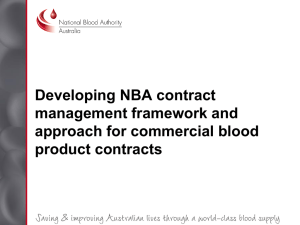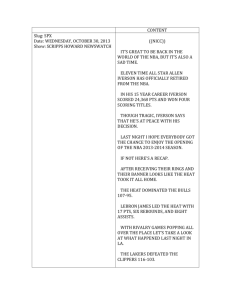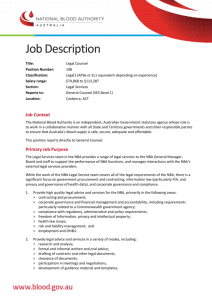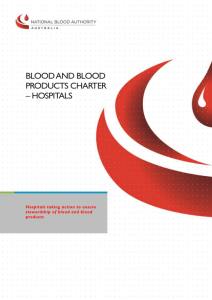General Practitioners and Other Health
advertisement
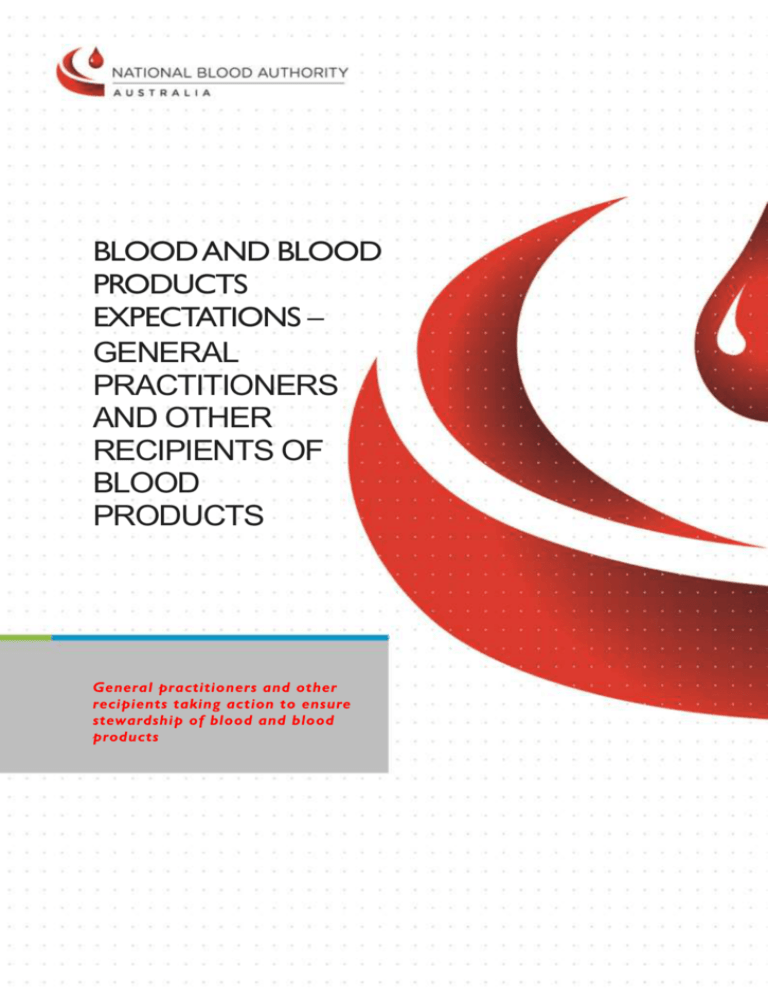
BLOOD AND BLOOD PRODUCTS EXPECTATIONS – GENERAL PRACTITIONERS AND OTHER RECIPIENTS OF BLOOD PRODUCTS General practitioners and other recipients taking action to ensure stewardship of blood and blood products Blood and blood products are provided to health providers for the treatment of patients with a wide range of conditions. Hospitals, doctors, laboratories and other health providers serve a vital role in ensuring these key resources reach the patients in need. In fulfilling this role you contribute to the sustainability of the blood supply by adopting stewardship measures for your own organisation. Quality improvement The National Blood Authority (NBA) is working to develop tools to assist health providers meet expectations in relation to their role as a steward of blood and blood products. Should you or your organisation be unable to meet any of the expectations, if you contact the NBA we would be happy to talk with you about tools that are available to assist you. The service offering to you The level of service that suppliers of blood and blood products are contracted to provide to health providers with regard to the ordering, delivery and management of blood and blood products is described at Attachment A. This document will also outline some actions you will need to take in order to receive that level of service, such as the meeting the lead time for orders sent to suppliers so that product can be delivered in accordance with the service stated. The objective of this document is to provide clarity to all health providers about the level and frequency of service they can expect from suppliers of blood and blood products. Your commitment The stewardship expectations of Health Ministers and the actions that you will need to undertake to meet each expectation are outlined in this document. Many of the required actions support the National Safety and Quality Health Service (NSQHS) Standard 7. Meeting these expectations is important to ensure that adequate, safe, secure and affordable supply of blood and blood products now and into the future. Mr Leigh McJames General Manager National Blood Authority 2014 Page 2 of 21 ATTACHMENT A: National Service Expectations for Health Providers – Blood and Blood Products Contents ATTACHMENT A: National Service Expectations for Health Providers – Blood and Blood Products . 3 Contents ....................................................................................................................................................................... 3 1. Introduction ........................................................................................................................................................ 4 2. Updates of this document ............................................................................................................................... 4 3. Contact numbers ............................................................................................................................................... 4 4. Overarching Expectations of Health Providers .......................................................................................... 5 5. BloodNet ............................................................................................................................................................. 6 6. The Blood Service ............................................................................................................................................. 7 6.1. Health provider approval process for products supplied and distributed by the Blood Service . 8 6.2. Health provider expectations relating to service from the Blood Service ........................................ 9 7. Definitions ......................................................................................................................................................... 17 8. Acronyms .......................................................................................................................................................... 19 ATTACHMENT B: Health provider expectations .............................................................................................. 20 Table of Contents Section Version 1.0 24 October 2014 Page 3 of 21 1. Introduction The purpose of this document is to outline national service requirements and standards (service level) you can expect from suppliers of blood and blood products, and the actions you need to undertake to receive that service level. It will help you to assess whether you are receiving the appropriate service level, or whether you need to ask for corrective action to be undertaken to achieve an appropriate service level. It will also provide you with clarity about the expectations of you as a steward of blood and blood products. As a recipient of blood and blood products, there are activities that you undertake to ensure that you have sufficient product available to meet clinical need, and to support tracking of blood and blood products from vein to vein. Such activities include ordering product, receipting product and activities to ensure product quality and safety. 2. Updates of this document The NBA will provide you with any updates of versions to this document. Each section of this document has its own version control to allow you to replace sections that have changed without the need to revise the entire document. This will be particularly important when new sections are added for other suppliers. 3. Contact numbers Throughout this document, there is guidance that you should contact either the NBA or a supplier for advice, guidance or to advise of a concern. The contact details are below: Organisation Contact details NBA 13 000 BLOOD (13 000 25663) support@blood.gov.au Australian Red Cross Blood Service (Blood Service) http://www.transfusion.com.au/contact/inventorydistribution The contact numbers for other suppliers will be added to this document when the relevant chapters on expectations relating to other suppliers are included. Overview Section Version 1.0 24 October 2014 Page 4 of 21 4. Overarching Expectations of Health Providers The Stewardship Statement outlines measures that Health Ministers expect all health providers to adopt within their organisation. Overview Section Version 1.0 24 October 2014 Page 5 of 21 As illustrated above, this includes the requirement to manage blood and blood products in ways that ensure: The use, management and administration of blood and blood products is in a manner consistent with national evidence based guidelines where available Informed patient consent procedures are implemented for all patients that are transfused with blood or blood products Processes, programs and facilities are in place to minimise the wastage of blood and blood products Facilities are accredited with the appropriate bodies to meet all quality and safety obligations Transfusion related adverse event information is collected and managed according to jurisdictional requirements Health providers have an ordering and receipt verification process in place which provides adequate financial accountability as required by governments Inventory data is provided on a regular and timely basis to assist in supply and demand planning, especially in times of national shortages In addition to these expectations, that align with the expectations of NSQHS Standard 7 – Blood and Blood Products, there are expectations that you will need to meet in order to receive a specified level of service from a manufacturer or distributor of blood and blood products. For example, expectations relating to when you should place an order to ensure you receive the order when you need it. These are outlined in the chapters of this document. Chapter 6 is dedicated to the Blood Service and the expectations of you in receiving blood and blood products, with chapters relating to other manufacturers currently under development. 5. BloodNet BloodNet is Australia's online blood ordering and inventory management system. It allows health providers across Australia to order blood and blood products in a standardised way, quickly, easily and securely from the Australian Red Cross Blood Service (Blood Service). BloodNet is easy to use and support is available 24 hours a day. BloodNet is free to Australian health providers and training is provided by National Blood Authority staff either face-to-face within the facility or online. For more information on BloodNet or to schedule implementation at your facility, contact the Health Provider Engagement team by email at support@blood.gov.au or phone 13000 BLOOD (13000 25663). Laboratory Information System (LIS) interface links health provider LIS into BloodNet to eliminate double-entry and enables the transfer of relevant data between stakeholders in the blood sector in a more timely manner. The LIS interface facility is currently available for some users. Please contact the Health Provider Engagement team to see if your LIS can be interfaced. Tip sheets and further information on BloodNet and the LIS interface is available on the NBA website at http://www.blood.gov.au/bloodnet. Overview Section Version 1.0 24 October 2014 Page 6 of 21 6. The Blood Service The Blood Service is the sole supplier of fresh blood products in Australia. The Blood Service also distributes some blood products manufactured by commercial suppliers. This chapter of the National Service Expectations for Health Providers – Blood and Blood Products relates to the products and services distributed by the Blood Service. Section 6.1 outlines the process for seeking approval to receive blood and blood products from the Blood Service. The tables in Section 6.2 relate to the service level to be provided by the Blood Service, and the actions you are expected to undertake to receive that level of service. The nationally consistent service offering is intended to meet the needs of all health providers. It seeks to identify nationally consistent service standards and expectations from the Blood Service. For this reason, the Blood Service will no longer offer separate agreements with you. Should you have concerns with this approach, or with the service offering outlined in this document, you should contact the NBA. In addition to the information provided, which is based on the current approach, the NBA is working with the Blood Service on a number of projects aimed to improve current practice. Any changes to the service level from the Blood Service or expectations of health providers will be reflected in future versions of this document. These projects include: The National Inventory Management Framework which aims to identify appropriate inventory levels and will include development of tools to support your inventory management practices in relation to red cells. Substitution and Payment Rules (S&PR), which will support moving toward payment by state and territory health departments on product receipted against an order, instead of payment for product issued. Blood Service Section Version 1.0 24 October 2014 Page 7 of 21 6.1. Health provider approval process for products supplied and distributed by the Blood Service In order to receive blood and blood products you need to meet the expectations of health ministers outlined in the Australian Health Ministers Statement of National Stewardship Expectations for the Supply of Blood and Blood Products (http://www.blood.gov.au/stewardship). 6.1.1. New Health Providers Application Submission 1. You contact the Blood Service to place an order for product or made preliminary contact with the Blood Service to seek information about how to order products in the future. It is expected that all health providers will seek this approval in a timely manner prior to the clinical need for blood and blood products. 2. The Blood Service will collect information from you, and will arrange for completion of the Health Provider Data Form. You should be aware that the information you provide to enable completion of this form will be shared with the NBA as well as with your local jurisdictional health department. 3. The Blood Service will forward your completed Health Provider Data Form to the NBA for validation and approval. 6.1.2. Assessment of applications 1. The NBA will review the Health Provider Data Form and advise the Blood Service the products you are able to receive under National Blood Arrangements. 2. The NBA will provide you with a copy of your completed Health Provider Data Form in accordance with a framework developed with each jurisdictional health department and determine whether it is appropriate for your organisation to receive blood and blood products, and which products may be supplied. You should also advise the NBA if there are any errors on your Health Provider Data Form. 6.1.3. Amendments to health provider details It is your responsibility to provide up-to-date details to the Blood Service of any change in details, including address, provider number etc. Blood Service Section Version 1.0 24 October 2014 Page 8 of 21 6.2. Health provider expectations relating to service from the Blood Service The Blood Service is the sole supplier of fresh blood products in Australia. In addition, the Blood Service distributes plasma-derived and recombinant products for a number of other suppliers. This chapter outlines the service level you can expect from the Blood Service, and what is expected from you as a health provider in relation to product and service delivery from the Blood Service. Health Provider Service offering to be provided by the Blood Service Health Provider Requirement Orders 6.2.1. Placing orders You can place orders for blood and blood You should place orders on BloodNet where it is products distributed by the Blood Service 24 hours available. Where BloodNet is not available, you should a day, 7 days a week. place orders using the BloodNet printable order form, and if you don’t use BloodNet you should place orders The Blood Service is available 24 hours a day, 7 using the Blood Service order form. Order forms should days to provide product advice to assist you in be faxed or emailed to the Blood Service. placing your order. Contact details can be found at http://www.transfusion.com.au/contact/inventory- If you are placing an urgent order through BloodNet distribution you will be prompted to call the Blood Service. The NBA makes available BloodNet 24 hours a day, 7 days a week to place orders. If you do not have access to BloodNet, the Blood Service will receive your orders by fax or email on the Blood Service order form or the BloodNet printable order form. The orders placed by health providers can impact the national inventory held by the Blood Service. Routine stock orders should only be placed to align with national guidance on inventory levels and specific patient orders placed to meet specific patient need. All orders should include the following information in addition to the information about the products to be ordered: Name of person placing order, and the order time and date Order type and priority Delivery address Required date Required time Component or product, including modifiers and/or phenotypes Requested quantity For Special Orders the following additional information is mandatory: Patient surname Patient first name Gender Date of birth Medical condition 6.2.2. Order acknowledgement You will receive automatic acknowledgment that If you do not receive an automatic order your order has been received by the Blood Service. acknowledgement, you should contact the Blood Service Blood Service Section Version 1.0 24 October 2014 Page 9 of 21 Health Provider Service offering to be provided by the Blood Service If you placed the order using BloodNet, the system will provide automatic acknowledgement that the order has been received. For orders placed by fax, this will be the fax transmission confirmation. The Blood Service will confirm all urgent orders within 10 minutes of receiving your order. Health Provider Requirement to confirm they have received the order. If you place an urgent order, you should receive a phone call from the Blood Service within 10 minutes to advise that it has been received. If you do not receive this phone call, you should call the Blood Service. In addition, you can also advise that you did not receive this order acknowledgement through BloodNet feedback. 6.2.3. Order confirmation The Blood Service will take all reasonable steps to fulfil all orders placed, noting points one to five below where the Blood Service may seek additional information. The Blood Service will provide you with verbal or written advice if your order cannot be fulfilled or will only be filled in part as follows: Verbal or written advice that an order cannot be fulfilled in full for all orders of routine priority as soon as possible and no less than 60 minutes prior to dispatch. Verbal advice that an order cannot be fulfilled in full for all orders of urgent priority, by telephone within 10 minutes of order receipt. The Blood Service will follow up the verbal confirmation with a written confirmation. You should have an appropriate person(s) available to discuss orders with the Blood Service. Except where the Blood Service is implementing a required gatekeeper function, it is your right as a health provider to make the final decision about the products you order. In times of shortage, the Blood Service may not be able to provide all products ordered. If the Blood Service does not provide advice about order fulfilment within the specified timeframes, please provide feedback to the Blood Service (see Feedback). As a part of its gatekeeper function the Blood Service may seek additional information from you about your order if: 1. It is considered that the order is unusual, irregular or exceptional with regard to relevant nature or volume of product ordered. 2. It is a product where the Blood Service has a role as gatekeeper, where product may only be issued with specific approval of the Blood Service such as the IVIg under the “IVIg Criteria for Use” as determined by the NBA on behalf of all governments. Where this occurs, the Blood Service may seek additional information with the order to confirm that it aligns with requirements of governments. Alternatively, the Blood Service may allow you to order product on an imprest Blood Service Section Version 1.0 24 October 2014 Page 10 of 21 Health Provider Service offering to be provided by the Blood Service 3. 4. 5. Health Provider Requirement arrangement, and provide the information following transfusion of the product prior. There is a supply shortage. The request is from a new health provider. The request is for a product that the health provider is not approved to receive. 6.2.4. Order amendment If the Blood Service cannot fill an order in full or in If the Blood Service does not seek your approval of any part, they may call you about amending the order. amendments to the order, please provide feedback to The order amendment may either reduce the the Blood Service (see Feedback). number of products ordered, or substitute the products ordered for an alternative product. Where a products substitution or deletion has been agreed, the Blood Service will include this in the written advice about order fulfilment. Implementation of the Substitution and Payment Rules (see page 6) will provide further detail to these requirements, and this section will be updated following their implementation. 6.2.5. Order priority and timing The Blood Service will include all routine priority orders in the next scheduled dispatch unless you specify a later required time in your order. If you want an order included in the next routine dispatch, you should place the order at least one hour prior to the next scheduled dispatch. All urgent orders will be ready for dispatch within 60 minutes of receipt of the order, where product is available in Blood Service inventory if the delivery is being undertaken by the Blood Service and available for dispatch or pick up if you are arranging delivery. You should only place an urgent priority order when there is an unforeseen clinical need or likely clinical need, for product prior to the next routine delivery. An urgent delivery is to be made by the earliest available standard transport mode (the Blood Service driver, taxi, third party freight agent or a Health Provider’s own courier). Note: the Blood Service will advise you of your routine dispatch times Delivery 6.2.6. Delivery mode and timing The Blood Service will deliver in accordance with the delivery mode and high level delivery schedule identified. In some cases, the standard delivery mode may include transport that you have arranged and you may arrange your own transport on an ad hoc basis, if agreed with the Blood Service. Orders of urgent priority will be ready for If you are arranging collection of product from a Blood Service depot, you should ensure that you and/or your nominated transport organisation have proper and appropriate insurance for the purpose. Collection of routine priority orders will only be available at the time agreed with the Blood Service. Urgent priority orders will be available for collection within 60 minutes of receipt of the order, where Blood Service Section Version 1.0 24 October 2014 Page 11 of 21 Health Provider Service offering to be provided by the Blood Service Health Provider Requirement dispatch within 60 minutes of receipt of the product is available from the Blood Service inventory. order, where product is available in Blood Service inventory or at a later time if requested by the If you are picking up product, or arranging for product health provider. to be picked up, the person undertaking the pick up should have evidence that you have instructed them to pick up the product. This should include the order number and personal identification. It is noted that this is not current practice, and transition arrangements will be in place to allow health providers meet this expectation (ie the Blood Service will remind health providers of this expectation, and move to full implementation over time). Where you are arranging a taxi to pick up an order it is noted that they may not have the order number. In these cases, the Blood Service will document the taxi company and number. 6.2.7. Delivery location The Blood Service will deliver product to the address on your Health Provider Data Form. You should advise the Blood Service if your delivery address changes. In exceptional circumstances (e.g. out of hours) the Blood Service may leave the consignment at a different location, where you have requested this in writing. In exceptional circumstances, such as out of hours, you may ask the Blood Service to deliver to a different location. You should place this request in writing. You should make sure there is someone at this location to receive the consignment. Receiving Products 6.2.8. Product responsibility The Blood Service is responsible for the integrity of the product until the point it provides the consignment to you or your nominee (such as when you arrange your own transport). That is: When the transport of the product is arranged by the Blood Service, the point of cold chain responsibility changes from the Blood Service to you when the Blood Service delivers the consignment to you. When the transport of the product is arranged by the you, the point of cold chain responsibility changes from the Blood Service to you when the Blood Service hands product over to the you or your nominee. You must engage in activities to maintain product quality including the cold chain requirements during product transport, and unpacking. You are responsible for integrity of the cold chain after the consignment has been delivered to you by the Blood Service, or after you or your nominee have picked up the consignment from the Blood Service depot. 6.2.9. Proof of consignment receipt The Blood Service is expected to retain If you do not receive a consignment that the Blood Blood Service Section Version 1.0 24 October 2014 Page 12 of 21 Health Provider Service offering to be provided by the Blood Service documentation of proof of consignment receipt. This is important to allow for Goods Order Receipt Verification (GORV). Health Provider Requirement Service says has been delivered, you should provide feedback to the Blood Service (see Feedback). This can be directly to the Blood Service, through BloodNet or to the NBA. That is: When the transport of the product is arranged by the Blood Service, the Blood Service should retain proof of consignment receipt by you at your delivery address. When the transport of the product is arranged by you, the Blood Service should retain proof of receipt of the consignment by you or your nominee when collected by you from the Blood Service depot. Where a taxi arranged by the Blood Service to deliver a consignment is used, it is noted that proof of consignment receipt cannot be obtained at this time. The Blood Service should retain proof of collection of the consignment by the taxi. 6.2.10. Product integrity checking The Blood Service will ensure that all blood and blood products are issued to you in accordance with the Blood Service Shipper Configuration Guidelines and TGA regulatory requirements for validated packaging and transport. The Blood Service will provide the Blood Service Shipper Configuration Guidelines to you. You should check: that products are packed in accordance with the Blood Service Shipper Configuration Guidelines the temperature logger (if one is included in the shipper), and confirm that temperature specifications have not been breached if there is no temperature logger, consider the time since dispatch and seek advice from the Blood Service if the transport time exceeds time stated on consignment whether the products are leaking, broken or have any other visible defect if the product has been subject to a recall of the product by the Blood Service. If you have any concerns about product integrity, seek advice from the Blood Service about whether the product can be placed into inventory, or should be discarded. In some circumstances the Blood Service may request that the product be returned to them. If this request is made, you should comply with this request. Any concerns about product integrity should also be entered into BloodNet as feedback (see Feedback). 6.2.11. Receipting of products and line items You should receipt product line items as soon as possible, and strive to complete this in no longer than Blood Service Section Version 1.0 24 October 2014 Page 13 of 21 Health Provider Service offering to be provided by the Blood Service Health Provider Requirement one hour after consignment receipt. Implementation of the Substitution and Payment Rules (see page 6) will provide further detail to these requirements, and this section will be updated following their implementation. BloodNet Health Providers You should receipt products received into BloodNet. If you receive a product you did not order, you will need to receipt it and provide feedback. Non-BloodNet Health Providers You are required to maintain records of receipt of product. You should provide this list of receipted items to the NBA on request. 6.2.12. Handling and stewardship of products The Blood Service makes their Blood Component Information (BCI) available on their website http://www.transfusion.com.au/library. The BCI includes the storage and handling requirements of their products. You should handle blood and blood products in a manner to minimise non-conformance with specifications in the BCI, the National Safety and Quality in Health Care Standards—Standard 7 and the NPAAC Standards and the Blood Service Shipper Configuration Guidelines. 6.2.13. Return of shippers and data loggers It is the responsibility of the Blood Service to arrange the return of the shipper and data loggers to the Blood Service. You should have shippers ready for pick up at the request of the Blood Service at an agreed location. If the Blood Service determines it is not effective to return the shipper, it is your responsibility as a health provider to reuse or dispose of the shipper. You are expected to return all data loggers to the Blood Service. The Blood Service will advise of the process for returning these items, which may include pick up by Blood Service transport. 6.2.14. Adverse event reporting The Blood Service advises Health Providers of the If you are responsible for reporting adverse events for types of adverse events that that must be reported blood products to the Blood Service, you should be to the Blood Service in the BCI. familiar with the BCI, which describes the types of adverse events that should be reported to the Blood Service 6.2.15. Product recall and lookback Occasionally it is necessary for the Blood Service to recall product or ask you to quarantine product. When a recall or quarantine is necessary, the Blood Service will advise you as soon as practicable and will issue instructions about what you should do. You are expected to have full visibility of products you hold, and are expected to be able to advise the Blood Service whether a product has been transfused, discarded or whether it is held in inventory. You are expected to cooperate with product recalls, Blood Service Section Version 1.0 24 October 2014 Page 14 of 21 Health Provider Service offering to be provided by the Blood Service You may be asked to either: quarantine the implicated product discard the implicated product return the implicated product to the Blood Service for further investigation The Blood Service will conduct any necessary investigations as soon as practicably possible. Health Provider Requirement and follow all reasonable instructions of the Blood Service and the TGA. You are expected to respond to any recall within 24 hours, or as soon as possible if no weekend service is available. If the product has already been transfused, you are expected to advise the Blood Service immediately. The Blood Service will inform you if further action is required. 6.2.16. Changes to products available The Blood Service and/or the NBA will advise you if there are any changes to the products to be provided. This will include providing you with bar codes for the new/changed products. 6.2.17. Intensive Product Management (IPM) The Blood Service will follow instructions from the NBA relating to Intensive Product Management of products that are distributed by the Blood Service. This may include vetting orders to ensure supply of product to the areas of highest clinical need. During a period of IPM, you may be asked to discuss orders with Blood Service staff to enable the supply of product to the areas of highest clinical need. Your cooperation is appreciated. 6.2.18. Contingency Planning and the National Blood Supply Contingency Plan (NBSCP) During activation of the NBSCP, the Blood Service During activation of the NBSCP, you are expected to will act in accordance with instructions issued by act in accordance with instructions issued by governments. governments. 6.2.19. Feedback and complaints Where you provide feedback through BloodNet or directly to the Blood Service, the Blood Service will provide you with acknowledgement of the feedback within 3 business days and advise you if the Blood Service consider that action is required to address any issue. You are encouraged to provide the Blood Service with feedback on any issue as part of a feedback/complaints process. There are three primary avenues for you to provide feedback or make a complaint. 1. BloodNet Where action is required, the Blood Service will The NBA BloodNet System has the capacity for provide you with advice about the actions of the you to enter feedback. The NBA will provide the Blood Service in response to the feedback within Blood Service will details of such feedback on a 7 business days, or at another time if further daily basis. time is required to respond. The Blood Service will 2. Feedback directly to the Blood Service advise you of any extra time required to develop Feedback can be provided to Blood Service by or implement relevant actions. email/phone/fax/etc. 3. Blood Service Customer Satisfaction The Blood Service will also provide you with the Survey findings from the Blood Service Customer The Blood Service conducts a survey of Health Satisfaction Survey if you participated. Providers annually. If you are not happy with the outcome of a complaint to the Blood Service, you can contact the NBA (see page 6 Blood Service Section Version 1.0 24 October 2014 Page 15 of 21 Health Provider Service offering to be provided by the Blood Service Health Provider Requirement for details). The NBA will work with you and the Blood Service, and any other relevant stakeholders, to seek to resolve the problem. Blood Service Section Version 1.0 24 October 2014 Page 16 of 21 7. Definitions Health Provider For the purposes of this document, a health provider is considered to be an organisation providing health services to the Australian community and approved by the NBA to receive blood and/or blood products. This is sometimes designated Australian Health Provider (AHP) and is the same as the term Approved Health Provider. BloodNet A system managed by the NBA for use by health providers for product orders, product line item receipt, and recording information on inventory levels, fate of the product and for health provider feedback. Component The identifier and description for each NBMS/BloodNet blood product code. Delivery Delivery of a product is physical delivery of a consignment to the health provider by the distributor or supplier. Discards Unused blood and blood products disposed of due to expiry, breakage or any other reason. Dispatch Dispatch is defined as the point at which a consignment leaves the suppliers/distributors premises. Distributor A distributor is an entity that is under contract with the NBA, or sub-contracted by an entity, to deliver blood or blood products or services. Gatekeeping Review of an order by the Blood Service to confirm that it satisfies specific criteria identified by governments before a product is supplied eg IVIg and SCIg. Goods Order Receipt Verification (GORV) This is a government term and relates to the ability to verify that a product that has been paid for by government has been ordered and received by the appropriate entity. Immunoglobulin A term encompassing IVIg, SCIg and NHIg. Imprest Imprest is holding of inventory for the purpose of having product available to meet clinical requirements. It has historical origins and is applied in some states and territories to a stock order for a product that is under special arrangements such as needing to meet qualifying criteria for access. It is often applied to stock orders for albumin and IVIg. Definitions Section Version 1.0 24 October 2014 Page 17 of 21 Intensive Product Management Intensive Product Management (IPM) is any special arrangements for a nominated product in relation to supply planning, production, inventory management, ordering, delivery, reporting, invoicing or payments. Line Item Receipt Line item receipt of product is the process by which the health provider electronically or manually receipts individual products. Order An order is a request for blood or blood products by a Health Provider, by phone call, fax, email, or made through a predetermined ordering system (e.g. BloodNet) for a product. Order Priorities Routine Routine orders are where the acceptable time for delivery is on the next scheduled delivery by standard transport mode. Urgent Urgent orders are where there is an unforeseen clinical need or likely clinical need for product prior to the next routine delivery and delivery will be made by the earliest available standard transport mode. Life-threatening Life-threatening orders are where there is a critical (life-threatening) need for immediate delivery of a product and delivery will be made by the most rapid transport mode available. Note: Assistance from emergency services may be sought to facilitate rapid delivery. Misuse of this order priority is not acceptable. This order priority does not apply to general practitioners. Order Types Stock Orders for replenishment of stocks taking into account the agreed health provider inventory levels. This order type also applies to imprest orders. Special Patient specific orders, blood components of extended phenotype and/or which require special processing or calling in of donors e.g. washed red cells, frozen-thawed red cells, HLA-matched platelets, autologous serum eye drops, other specific modifiers, and plasma-derived products not held in inventory (including IVIg). Consignment Receipt Consignment receipt is the physical passing of the shipper containing the blood or blood products to the health provider or nominee of the health provider. Product Those products included on the National Product Price List (NPPL) and approved by the Standing Council on Health (SCoH) for supply to health providers. Definitions Section Version 1.0 24 October 2014 Page 18 of 21 Product Recall An action taken to resolve a problem with a blood or blood product already supplied in the market for which there are issues or deficiencies in relation to safety, quality, efficacy (performance) or presentation. Quarantine Product on hold by a Health Provider at the request of a supplier, pending investigation on whether the product needs to be recalled or discarded. Supplier A supplier is an entity that is under contract with the NBA to supply blood and blood products, and blood related services. Wastage Avoidable discards of blood and blood products 8. Acronyms AHP BCI GORV IPM IVIg NBA NBMS NBSCP NPAAC NPPL NSR&S NSQHS S&PR SCIg SCoH TGA Australian/Approved Health Provider Blood Component Information Goods Order Receipt Verification Intensive product Management Intravenous Immunoglobulin National Blood Authority National Blood Management System National Blood Supply Contingency Plan National Pathology Accreditation Advisory Council National Product Price List National Service Requirements and Standards National Safety and Quality Health Service Substitution and Payment Rules Subcutaneous Immunoglobulin Standing Council on Health Therapeutic Goods Administration Definitions Section Version 1.0 24 October 2014 Page 19 of 21 ATTACHMENT B: Health provider expectations Stewardship Expectation Health providers are accredited with the appropriate bodies to meet all quality and safety obligations Systems are in place to ensure that blood and blood products are appropriately managed to ensure product safety and quality Expectations of General practitioners or other recipients of blood products The organisation or practice is accredited by the relevant accrediting agency All refrigerators and freezers that are used to store blood and blood products have been assessed under the relevant accreditor or comply with AS3864 – the Australian Standard for the storage of medical refrigeration equipment for the storage of blood and blood products or the National Vaccine Storage Guidelines The organisation or practice takes necessary action to ensure that relevant critical equipment performs as required The organisation or practice collects and monitors data on wastage Processes, programs and facilities are of blood and blood products, reports wastage data (i.e. reports on in place to minimise the wastage of all discards) at the state or territory and/or national level, and blood products participates in a state or territory and/or national wastage reduction program Inventory data will be provided on a regular and timely basis to assist in supply and demand planning, especially in times of national shortages The organisation or practice agrees to provide inventory data on request by the National Blood Authority Ordering and receipt verification process will be in place to provide adequate financial accountability as required by governments The organisation or practice retains documentation of blood and blood products receipted, and fate of product for 20 years All blood products are used in a clinically appropriate manner in accord with relevant professional guidelines and standards The organisation or practice collects information on how blood products are used and monitors the use and improvements against relevant professional guidelines and standards A best possible history of blood and blood product usage is documented in the patient clinical record The organisation or practice is able to identify the recipients of all blood and blood products received Informed patient consent procedures are implemented for all patients The organisation or practice takes action to ensure informed patient consent is achieved for all transfusions, and monitors that this occurs Strategies are in place to reduce occurrence of transfusion related adverse events, and minimum data and reporting requirements are met The organisation or practice implements strategies to reduce adverse transfusion events and actively monitors and reports adverse transfusion events For queries, please contact: National Blood Authority 13 000 BLOOD (13 000 25663) Locked Bag 8430 Canberra ACT 2601 Expectations Section Version 1.0 24 October 2014 Page 20 of 21 charter@blood.gov.au Expectations Section Version 1.0 24 October 2014 Page 21 of 21
